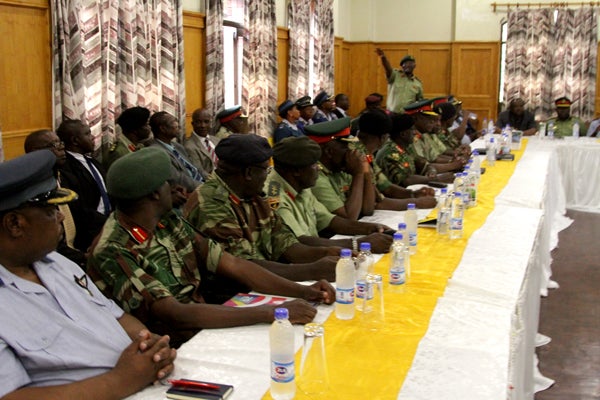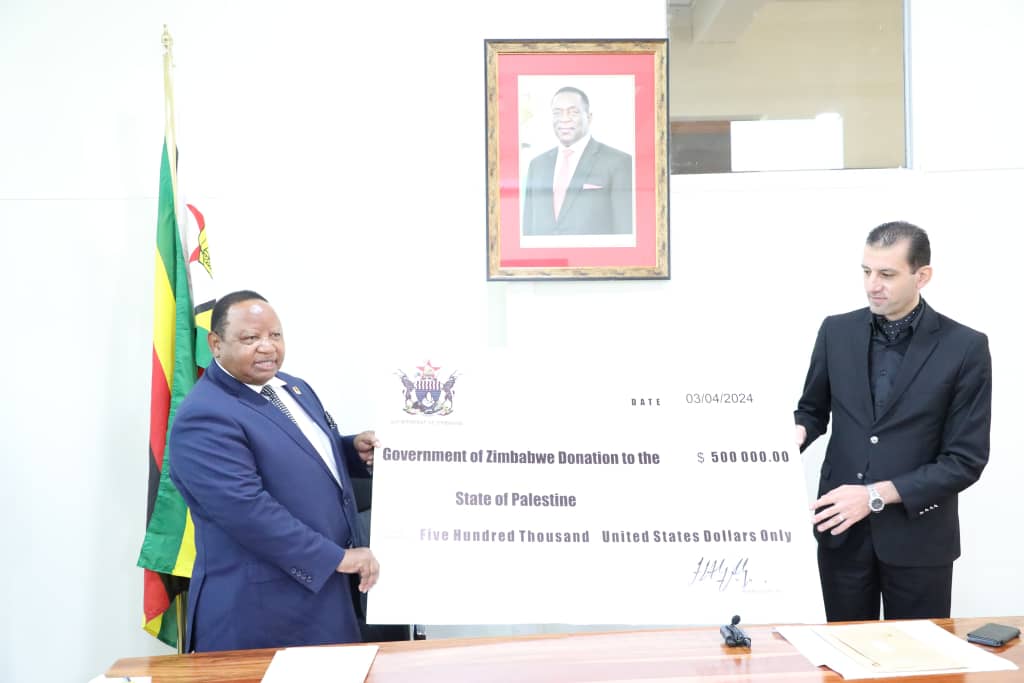
In March 2020, Zimbabwe’s National Army Commander Edzai Chimonyo said that the military would soon start prying into private communications between citizens to “guard against subversion”.
Speaking at a military graduation course held at Zimbabwe Military Academy in Gweru, Chimonyo expressed satisfaction that the course had laid a proper foundation in the area of cybersecurity, telling senior officers:
Social media poses a dangerous threat to our national security. Social media is one of the tools that is being used for misinformation and I believe that your training has been an eye-opener to the rigors and realities of technological advancements.
This declaration by the military has sparked outrage among Zimbabweans, many of whom are concerned over the increasing deterioration of freedom of expression in the country.
Last year, President Emmerson Mnangagwa’s Cabinet gave the nod to the Cyber Crime, Security and Data Protection Bill and set it to be tabled for debate in parliament. The Bill, which was drafted in 2016, is designed to fight cybercrime — but if passed, it will also give the government the latitude to snoop on citizens’ private communication.
Early last year, the government also ordered an internet shutdown, after protests erupted over fuel price increases. Owen Ncube, the state security minister who ordered the shutdown, said social media was stoking the anger among citizens.
The bill contains a number of problematic provisions that would further restrict Zimbabweans’ right to freedom of expression online, if adopted. Section 17 prescribes a prison sentence of up to five years in jail against those convicted of speeding ”false” information with the with the intention ”to cause psychological or economic harm.”
Harris Dakwa, a teacher by profession, suggested that if the Bill were to pass, it would prompt self-censorship on such a large scale that it would be tantamount to the nation regressing to a time before the concept of freedom of expression even existed. In an interview with Global Voices, he noted:
This [statement] instills unnecessary fear amongst the populace. I think the government needs to be clear on what constitutes a threat. […] Government and intelligence agencies need to be more transparent about surveillance and not abuse it and people’s rights, or use it to further their insidious activities.
Patrick Goteka told Global Voices that unfettered access to the internet and social media goes along with good governance:
The government of Zimbabwe […] wants to control the people in everything. […] The advent of social media alerts everybody to know exactly what is wrong and what is right. It [allows] people to be aware, to understand themselves, their society and to be able to fight for their rights. Once citizens are empowered through social media, they know where to go and who to confront should their rights be violated.
The Media Institute of Southern Africa (MISA) expressed serious concern over the statement. Zimbabwe Director Tabani Moyo said in a tweet:

MISAZimbabwe✔@misazimbabwe · Mar 3, 2020Replying to @misazimbabwe and 4 others
Misa Zim director @TabaniMoyo said- “The issue of regulating the digital space should be done in a structured manner whereby there is a law that comes into effect…”#HandsOffNetZW #digitalrightsZWhttp://bit.ly/32LvH6n Army to monitor social media – NewsDay ZimbabweTHE Zimbabwe National Army (ZNA) commander Edzai Chimonyo says the military would soon start snooping into private communications between private citizens tonewsday.co.zw

“…The language of the uniformed forces threatening to undertake surveillance on quite sweeping statements of trying to counter surveillance materials is quite shocking”.- @TabaniMoyo #HandsOffNetZW #digitalrightsZWhttp://bit.ly/32LvH6n Army to monitor social media – NewsDay ZimbabweTHE Zimbabwe National Army (ZNA) commander Edzai Chimonyo says the military would soon start snooping into private communications between private citizens tonewsday.co.zw18:13 AM – Mar 3, 2020Twitter Ads info and privacySee MISAZimbabwe’s other Tweets
He also insisted that digital spaces should remain regulated through the Ministry of ICTs, not the military:

MISAZimbabwe✔@misazimbabwe · Mar 3, 2020Replying to @misazimbabwe and 5 others
@misazimbabwe in an earlier statement spoke on the need for Zimbabwe to adopt a rights-based approach in its regulation of the Internet. The full article is available at this link: http://bit.ly/32jwWcv #HandsOffNetZW #digitalrightsZW @OpenParlyZw @kubatana @accessnow


“…regulation of the digital space should be left to the civilian arm of the government through the Ministry of ICTs.”- @TabaniMoyo #HandsOffTheNetZW #digitalrightsZW

29:06 AM – Mar 3, 2020Twitter Ads info and privacySee MISAZimbabwe’s other Tweets
While many netizens wrote scathing remarks, social media user Nobleman Runyanga had a more sympathetic take toward the military’s role in “peace and security’’:

Sharai Joseph@SharaiJoseph · Mar 3, 2020
After noticing that social media is fast becoming a threat to national security & private communications between private citizens Commander #Zimbabwe National Army Edzai Chimonyo says from now on all social media platforms will be closely monitored by the military.



Nobleman Runyanga@NobleRunyanga
The military, like other security services stakeholders, has a mandate to maintain national peace and security. If citizens like @hwendec @hwende & @JobWiwaSikala continue to abuse the social media they will be fished out and they will have no one to blame.

18:30 AM – Mar 5, 2020Twitter Ads info and privacySee Nobleman Runyanga’s other Tweets
Newsday, an independent daily, posited in an editorial that Zimbabwe may be “hurtling toward being a military state”:
[…] it is our sincerest hope that the military’s proposed monitoring of the social media space is not meant to silence citizens and target individuals who choose to freely express themselves on how they and their country are being governed […]
What is currently circulating on social media platforms are public secrets and citizens are largely debating, commenting and expressing their disgust as well as anger at the state of affairs in the country.
While the army has its own intelligence service, citizens hardly ever know what it does — and when the military comes out in the open on such issues, it is bone-chilling and vindicates assertions that the southern African nation is now hurtling toward being a military state.






